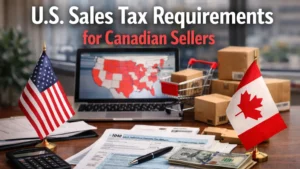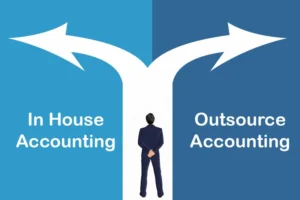Starting a business in Canada feels exciting. Choosing a structure brings tax implications of business structures into focus. This choice shapes your taxes, risks, and growth path. It’s not just paperwork. Freelancers work solo. Startup founders chase big plans. Small business owners keep it local. Each faces a decision that drives cash flow. We’ll explore sole proprietorship vs corporation tax implications, partnerships, and more. This helps find the best business structure for tax savings in Canada. We’ll also cover Canada business incorporation tax benefits. SAL Accounting stands ready to assist. Let’s dive in.
Quick Takeaways
- Sole Proprietorship: Easy start, full control, but you’re liable for all. Tax ranges from 15% to over 50% on personal income.
- Partnership: Team up, split profits, still risky if debts stack. Tax splits at personal rates, like solo.
- Corporation: Shields your personal assets, saves with a 9% tax on first $500K, more setup effort. Tops for bigger profits
- Best Move: Under $50K, go solo. Over $100K, incorporate.
Why Your Business Structure Matters
Your structure is the foundation of your business. Get it wrong, and you’re hit with heavy taxes or exposed to risks. Get it right, and you keep more cash while staying safe. It’s about your tax bill, what happens if a client skips out, and how quickly you can start. Canada offers three main options: sole proprietorship, partnership, and corporation. Each has its own tax implications of business structures. Let’s dive into them.
The Main Options in Canada
Here’s the lineup: sole proprietorship, partnership, and corporation. We’ll cover the pros, cons, and tax details so you can see what fits.
Sole Proprietorship: Tax Implications of the Solo Hustle
You’re the only player. No legal split between you and your business—it’s all you. Think freelancers, consultants, or online sellers. Easiest way to get going.
Pros
- Cheap Start: Register for about $49 with Ownr or a bit more through government sites. Done fast.
- Total Control: You make every call. No partners to argue with.
- Tax Bonus: Losses cut your personal tax. Earn from a job, lose some here? Pay less overall.
Cons
- Big Risk: Owe a chunk or get sued? Your car, savings, or house could be at stake. Unlimited liability stings.
- Tax Hit: Profits get taxed at your personal rate, starting at 15% and climbing past 50% for bigger earnings. Check the CRA’s personal tax rates for details.
How Taxes Work
Everything goes on your personal return with Form T2125. No extra filings, just one sheet. Tax starts at 15% but can soar over 50% in places like Ontario for six-figure profits. Plus, you pay double CPP since you’re both the boss and worker—covering the full contribution yourself instead of splitting it like in a regular job. Sole proprietorship vs corporation tax? Solo’s tougher on bigger income.
Example: Say you’re self-employed with decent income. In a regular job, you’d split CPP with your boss—half each. Solo, you pay the whole thing, like $6K on $50K earnings. It’s cash you don’t see back till retirement.
Who’s It For?
Perfect for small earners around $50K or less. Over half of Canada’s small businesses pick this, per StatsCan’s latest data. Low cost, low fuss. Bigger profits or risks? Might need a change.
🌟 Pro Tip: Snag every deduction—home office, supplies, phone bit. It’s free cash off your tax. Keep receipts, CRA is strict.
Case Study: Sarah’s Freelance Fix
The Problem: I’ve worked with so many freelancers like Sarah who hit roadblocks as their business grows. She was making $50K with her graphic design business but started worrying when taxes kept climbing. Then a client ghosted her on a $3,200 project, and suddenly she was calling us worried about making her tax payments.
What We Did: Sarah loved how simple sole proprietorship was, so we helped her register properly for just $49. When she came in, we sat down and went through everything – her home office setup, computer equipment, software subscriptions – and found $5K in deductions she didn’t know she could claim.
The Result: Her tax bill dropped from $7,285 to $6,258 – money she could put right back into her business. She’s doing great now, but once she hits around $100K, we’ll talk about incorporation for even better tax breaks and protection. She tells me she sleeps better knowing her finances are in order.
➜ Read more: “Can a Canadian Corporation Own a US LLC?”
Partnership: Tax Implications of Teaming Up
You and a partner run the show together. Maybe two consultants or a family business. No legal divide, just more hands on deck.
Pros
- Split the Load: Share startup costs, around $200 total, plus skills and stress. The CRA’s partnership guide lays it out. One’s sales, other’s numbers? Perfect match.
- Tax Share: Losses split up. Lose some? Each claims a piece to ease personal tax.
- More Juice: Your partner might bring cash or contacts you’d miss.
Cons
- Double Risk: Both on the hook for debts, even if your partner messes up. Big bill? You’re both stuck.
- Team Decisions: Need agreement on calls. Clashing can drag you down.
How Taxes Work
Income flows to your personal returns, each reports their cut. Big partnerships file a T5013 statement if they’re over certain thresholds (like millions in assets, per BDO’s small business deduction tips) but most small ones skip it. Taxes hit personal rates, starting low and climbing with profit, plus CPP adds up. Limited partnership taxation Canada applies—deductions like rent split too.
Example: Imagine you and your partner run a small operation. They sign a bad deal, owe $20K. You’re stuck paying too, even if you didn’t agree. That’s the catch. Both are liable, no escape.
Who’s It For?
Great with a trusty partner splitting profits. Affordable and mixes strengths, but that shared risk matters. Pick someone solid.
🌟 Pro Tip: Spend a bit on a partnership agreement, like BDC suggests in their business structures guide. Beats a debt fight. Trust’s key.
Case Study: Mike and Lisa’s Design Dilemma
The Problem: Mike and Lisa’s web design partnership was going great until trust became an issue. They were splitting $80K in revenue, but then disaster struck – a restaurant client bailed on a $20K website project. The real problem? Mike had signed the contract without Lisa seeing all the details, and now they were both on the hook for the loss.
What We Did: We kept their existing $200 partnership setup but added something crucial during our meeting. I showed them how a simple partnership agreement could save their business (and friendship) by clarifying who’s responsible for what. We created approval rules for any project over $5,000 to prevent future surprises.
The Result: They weathered the storm and are back on track. When I showed Lisa how incorporation could shield their personal assets, her eyes lit up. “Why didn’t anyone tell us this before?” she asked. Now we’re planning their transition while they rebuild their business reserves.
Corporation: Canada Business Incorporation Tax Benefits
Your business gets its own legal life, separate from you. Limited liability, tax breaks. For serious entrepreneurs or risk-conscious owners. Learn more about SAL’s corporate accounting services to maximize these benefits.
Pros
- Safety Net: Owe big or sued? Your house and car stay safe, business takes the hit.
- Tax Win: 9% tax on first $500K profit for CCPCs. KPMG’s corporate tax rates breakdown shows it beats personal rates.
- Growth Ready: Eyeing investors or a sale? Made for it.
Cons
- More Work: Setup’s a few hundred bucks when you file with Corporations Canada, filings like T2 take time or help. Follow our step-by-step incorporation guide for details.
- Double Lite: Profits at 9%, dividends add a bit more. Still lighter than solo.
How Taxes Work
File a T2. CCPCs with active income—think sales, not rent—get 9% on first $500K, phasing out with huge capital. Add a small hit if you take dividends—still less than solo’s personal rates. Corporate tax rates Canada shine here. Deductions like some meals apply, pros handle it best.
➜ Read more: “10 Strategies For US Citizen Living Abroad Tax Exemption”
Who’s It For?
Ideal for growing businesses around $200K or earners over $100K wanting safety. Most firms shift here as they grow, per StatsCan’s latest stats.
🌟 Pro Tip: Park profits at 9%. Tax-deferred growth beats cashing out early.
Case Study: Alex’s Retail Rescue
The Problem: Alex’s sporting goods store in North York was doing well with $200K in sales, but his tax situation was a mess. A $50K dispute with a supplier had him worried about losing everything, and the high taxes were preventing him from growing his inventory. He came to us wondering if he’d made a mistake going into business.
What We Did: “Let’s incorporate,” I told him. For $500, we created a corporate structure that protected his personal assets and locked in that sweet 9% tax rate. I walked him through each step, reorganized his books, and handled his T2 filing. We even gave him a checklist for updating his bank accounts.
The Result: His tax bill dropped dramatically from $48K to just $18K – that’s $21K back in his pocket! “SAL made what seemed complicated actually straightforward,” he told me recently. With the tax savings, he’s expanded his inventory and is looking at adding a new product line.
How Liability Changes with Each Structure’s Tax Implications
Liability’s a game-changer. Here’s how it ties to tax implications of business structures.
- Sole Proprietorship: You’re wide open. Big debt or suit hits your house. Tax savings don’t help if you’re wiped out.
- Partnership: Double trouble. A major failure? Both pay, even if one signed. Shared tax splits don’t cover personal risks.
- Corporation: Locked tight. A hefty suit? Business absorbs it, you’re safe. Tax advantages of incorporation in Canada pair with peace.
Example: Picture a $50K lawsuit. Solo, your savings are toast. Corp, the business pays, your personal stuff’s untouched. That’s the shield. Most owners switch to corporations for liability, per BDC’s latest survey on business advantages. Tax savings plus safety’s a win.
🌟 Pro Tip: Solo or partnered? Grab affordable insurance from a spot like Intact Insurance to cushion blows.
Tax Comparison: Seeing the Numbers
Here’s a quick look at tax on solid profit.
| Structure | Total Tax Paid | What You Keep | Notes |
| Sole Proprietorship | Higher | Less | Personal rate climbs |
| Partnership | Higher | Less | Split between partners |
| Corporation | Lower | More | 9% corp + small dividend hit |
Corporation keeps more cash. Solo and partners add CPP, bumping costs. Corps save there, filings cost a bit.
Tax Implications: Sole Proprietorship vs Corporation
Taxes are the big decider for picking the best business structure for tax savings in Canada. Let’s break it down step by step to see how sole proprietorship stacks up against corporation.
How Taxes Work with Small Earnings
When your profits are on the smaller side, the tax game looks different for sole proprietorships and corporations. It’s not a huge gap yet, but it’s worth knowing how it shakes out.
- Sole Prop: Starts at 15% tax, but you’ve got CPP since you’re both boss and worker. Deduct some expenses, save a bit.
- Corp: Hits 9% on early profits. Add a small dividend tax if you pull cash, still beats solo with setup cost.
For smaller operations, solo’s simplicity might feel good, but that corp rate’s tempting even at this stage.
How Taxes Work with Big Earnings
Once profits climb higher, the tax difference really pops. Sole proprietorship starts to sting, while corporations keep it lighter.
- Sole Prop: Tax jumps way over 30%, plus CPP keeps hitting. It’s a tough climb.
- Corp: Stays at 9% on first $500K, dividend tax adds a bit. Saves you a bundle.
As you grow, that 9% rate turns into real cash in your pocket—way more than solo can offer.
The GST/HST Twist
Sales hitting a certain mark bring GST/HST into play, and it’s a twist that affects both setups. Here’s how it lands. If you have over $30K sales; GST/HST kicks in—check our GST/HST guide for the rundown. Also if you spend money on taxable stuff like supplies, you can claim some back either way.
- Solo & Partners: Collect it on personal returns, no separate filing.
- Corp: Handles it separately, keeps it clean.
It’s an extra layer that grows with your business, but corps handle it smoother.
Don’t miss equipment deductions—folks skip savings yearly. QuickBooks Canada keeps it tight. Compliance costs a bit yearly, per CFIB’s latest report. Bigger profits, corp shines.
➜ Read more: “Best Bookkeeping Tools for Small Business Owners in Canada”
Case Study: Jen’s Bakery Boost
The Problem: Jen’s gluten-free bakery in Mississauga was facing a classic small business challenge. She was making $150K selling at farmers’ markets, but a $38K tax bill meant she couldn’t afford to expand. “I’m working harder but keeping less,” she told us during her first visit. No one had mentioned incorporation to her.
What We Did: We switched her to a corporation, filed her T2, and found tax credits her previous accountant had missed. Going through her records, we discovered significant deductions for her specialized baking equipment that she could claim. “This is like finding money!” she said during our review.
The Result: Her tax bill dropped to $20K – saving her $18K that went straight toward growth. She emailed me recently: “That new mixer and part-time helper have changed everything – I’m supplying two cafés now with wholesale orders!” Her business has room to grow with the right structure.
Picking the Right Fit for Tax Savings
Where do you fit? Match your situation.
Go Solo If…
Small earnings, loves cheap start, no big filings. Over half agree, per StatsCan data. Bigger profits, taxes sting.
Partner Up If…
Solid teammate, low start, shared smarts. Risk hangs around.
Incorporate If…
Solid earnings or dislike risk. Saves tax, stays safe. Most shift here, StatsCan data.
When to Switch Structures (and How) for Tax Benefits
Your business grows, so should your structure. Here’s the deal.
When to Switch
- Profit Jump: Bigger earnings mean higher taxes solo, less with a corp’s 9% rate.
- Risk Alert: A large debt nudges you to shield your personal assets with incorporation.
- Growth Push: Hiring or expanding needs a corp’s flexibility and tax breaks.
How to Switch
- Solo to Corp: Articles of Incorporation, modest fee when you file with Corporations Canada. CRA number, one week. Our skilled incorporation tax experts can handle the entire process for you.
- Partnership to Corp: Dissolve, incorporate, reasonable cost.
Example: Say your profits double overnight. Solo, you’re scrambling with high taxes. Corp setup takes a week, cuts your rate to 9%, and protects your home. Easy pivot.
Conclusion
Tax implications of business structures present challenges—sole proprietorship vs corporation tax, risks, filings pile up. SAL Accounting stands ready to guide you. We’ve guidedmany clients to save cash, avoid pitfalls, and move forward with Canada business incorporation tax benefits. We break it down, file smart, grab every break. Contact SAL Accounting today for a free call with me!
FAQs: Your Top Questions Answered
Small earnings favor solo’s low tax. Bigger profits, corp’s 9% rate saves more. Depends on your situation.
When profits hit $50K to $100K or risk increases. Saves tax and shields you.
Small earnings mean manageable tax plus CPP. Bigger profits, it’s steep—way more than corp.
Bigger earnings, yes—saves cash and protects. Small profits, setup might not pay off yet.
Be a CCPC, keep capital modest, earn active income up to $500K. Gets 9%—most small businesses qualify. Have more questions? Contact our cross-border specialists for personalized advice.






